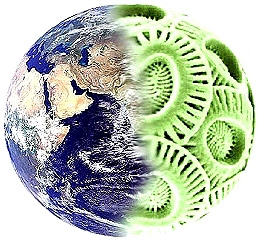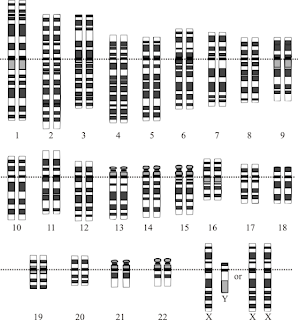
We Homosapiens evolved to have the ability to manipulate our environment and change it to suit us. The life forms of earth are intertwined and interdependent in a biosphere that is fueled by sunlight and feeds on itself except for a few very primitive forms of life that can find nutrients in inorganic sources like soil and rock. If Gaia as the entity of life on Earth is a valid allegory for the Earth's biosphere, then it may be reasonable to explain our emergence as Gaia's attempt to cope with future life threatening disasters such as asteroids.
 Never was there another species able to anticipate a giant rock from the sky, and actually contemplate what might be done to avert its damage.
Never was there another species able to anticipate a giant rock from the sky, and actually contemplate what might be done to avert its damage. 


Now, we have turned our minds to the very nature of what we are right down to the very genetic code that gives rise to every aspect of our forms. Even before we get to cloning humans, we are already at work affecting the evolution of our descendents. We are dramatically shortening the process of species evolution within ourselves and we may be surprised how quickly our descendents become another species beyond Homosapiens. Although this is inevitable, it's not too late to ponder and plan what is best. There is wisdom in our current DNA. It has been winnowed through natural selection over eons and a multitude of bad mutations did not survive attrition. As we tinker with our species we dare not lose the original Homosapiens gene pool.
Homoperfectus is the presumed descendent from Homosapiens, but which species will be Homoperfectus? As different individuals and groups make decisions about what their offspring will be, people will make choices for a multitude of reasons, some of it scientific, humane and rational, but there's bound to be those whose culture or religious mind sets lead to human traits you or I might find wierd or objectionable. As we steer the descent of the our genetic line, it is inevitable that differences in objectives will begin to appear, and in time the Earth will be populated simultaneously by multiple species who branched off from homosapiens.
Some species may be developed for climate comfort. Since higher forms of animals can live practically anywhere on Earth, we may have human species adaptations such catlike pelts, or a functioning appendix for digesting simple vegetation, larger lungs for living at high altitudes, and I am not the first to suggest gills for breathing underwater. However, actual species that descend from us, may not be so dramatically different, yet different enough to be considered different species.
Philosophically you have to ask what is it about us that makes us human? We are "The Naked Ape". If you haven't read the Desmond Morris book, I highly recommend it. If our descendants are neither naked nor apes, could other traits still make them human? On the other hand, maybe human means the sum of what we are exactly as we are now?

What role will religion and culture play in shaping new human species? Might not some cultures seek to turn off the brain receptors that respond to euphoric drugs, which probably means they will also lose their natural body chemistry which wards off pain and depression. Other cultures might actually do the "Brave New World" thing of creating a worker species with little aspiration in life beyond doing their job and pleasing their masters. Other cultures might remove the pleasures of sexuality. Now there's an ugly thought, and there's enough Puritan mental illness remnant in our culture that that is a possibility.
My choice for homoperfectus is that species which looks pretty much the way we do, but beauty is more common place and physical defects nonexistent. Their bodies will be naturally athletic with a powerful immune system, and they will have a more complex neural system with enhanced senses. Homoperfectus will be talented and affable, clever and compassionate. Most likely sex will be better too. Isn't that what you would choose? Most of all, Homoperfectus will inherit that human spirit which drives us to constantly reach beyond survival to meaningful existence.
As we develop the role of our lead character Felix in "Drones, Clones and Pheromones" we keep reconsidering how much he should be like us and how much is enhanced. Felix has genes implanted in his DNA from both other animals and plants to restore traits that Homosapiens lost along the way from our ancestors. Our eyesight for instance is tri-color with our retinal cones dyed to filter bands of red, green and blue colors. Our ancestors had four, with the blue being divided into two bands that extended into ultraviolet. Birds still have this 4 color eyesight. More recent ancestors lost the two blue to ultraviolet senses, then even more recently we regained a single blue with no ultraviolet sensitivity. That is where we are now. It would not be a big stretch to restore ultraviolet sight in our Homoperfectus species. This could have significant survival value, and would lend visual artists a huge new pallete of colors. We can only sense about 500 pheromones, but with the restoral of the vomeronasal organ of lesser mammals, we could again recognize 1,500. The grand prize perhaps of the Homoperfectus species will be turning off the aging process once they reach maturity. Guess what? We already know how!

No comments:
Post a Comment